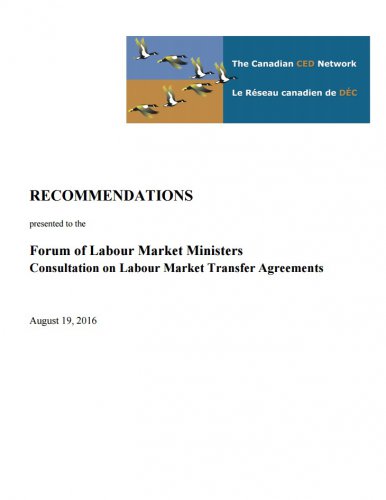As documented in the 2015 report on Social Finance by the House of Commons Standing Committee on Human Resources, Skills and Social Development and the Status of Persons with Disabilities, community economic development initiatives have a proven track record for engaging vulnerable populations in the workforce to enhance Canada’s productivity and creating new opportunities all.
Quality jobs with good wages and benefits play a very important role in the fight against poverty. For individuals facing multiple barriers to employment, supportive and flexible training and job opportunities are crucial for securing labour market attachment. The LMTAs have the potential to provide those opportunities and support community-based employment development initiatives that reduce poverty.
Key Recommendations
- IMPACT
- Include wrap around services in the scope of activities that are eligible for funding to help under-represented groups integrate into the labour market
- Remove funding targets (i.e. the mandated percentage of transfer dollars to be allocated to the Canada Job Grant (CJG) program each year), so that provinces and territories are able to allocate transfer dollars to a wider range of programs, including self-employment programs
- Ensure flexibility in program length to help under-represented groups integrate the labour market
- Reinstate the original policy objectives of the former LMAs and ensure the flexibility required so that funding can be used to train and hire equity seeking groups in infrastructure projects
- Extend funding to address the service gap that exists when jobseekers with barriers to employment transition out of training and into employment
- INNOVATE
- Build on the success of work-integration social enterprises
- Expand the use of Social Procurement and Community Benefit Agreements
- Broaden the definition of successful outcomes
- Support broader community engagement and local level decision-making
- INFORM
- Emphasize evaluation and communication of results in funded programs
About the Canadian CED Network (CCEDNet)
The Canadian Community Economic Development Network (CCEDNet) is a member-driven, not-for-proft, charitable organization made up of community-based organizations, co-operatives, social enterprises, practitioners, active citizens, researchers, and other organizations involved in community economic development (CED). Throughout Canada, CCEDNet members are helping local residents take action to build healthy, inclusive and vibrant places by creating economic opportunities that improve social and environmental conditions.
The following people and organizations are members of the Canadian CED Network’s Policy Council:
Lars Boggild, Purpose Capital, Toronto, ON
John Buck, Community Economic Development and Employability Corporation (CEDEC),Montréal, QC
Crescentia Dakubo, Thunder Bay, ON
Ryan Gibson, University of Guelph, Guelph, ON
Norman Greenberg, Alternative Programs for Youth and Families, Halifax, NS
Courtney Hare, Momentum, Calgary, AB
Walter Hossli, Momentum, Calgary, AB
Marianne Jurzyniec, Affinity Credit Union, Saskatoon, SK
David LePage, Accelerating Social Impact CCC, Vancouver, BC
Carol Madsen, Vancouver, BC
Elspeth McKay, Operation Come Home, Ottawa, ON
Rupert Downing, Community Social Planning Council of Greater Victoria, Victoria, BC





